The Intel SSD 760p 512GB Review: Mainstream NVMe Done Right
by Billy Tallis on January 23, 2018 11:30 AM ESTSequential Read Performance
Our first test of sequential read performance uses short bursts of 128MB, issued as 128kB operations with no queuing. The test averages performance across eight bursts for a total of 1GB of data transferred from a drive containing 16GB of data. Between each burst the drive is given enough idle time to keep the overall duty cycle at 20%.
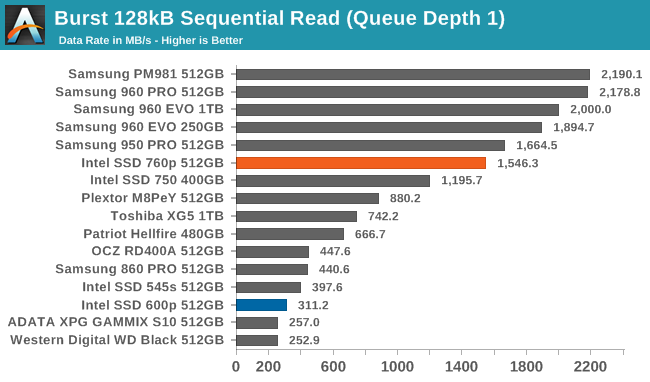
The burst sequential read speed of the Intel SSD 760p is a substantial improvement over the Intel SSD 750 and 600p, but isn't quite fast enough to match Samsung's NVMe SSDs.
Our test of sustained sequential reads uses queue depths from 1 to 32, with the performance and power scores computed as the average of QD1, QD2 and QD4. Each queue depth is tested for up to one minute or 32GB transferred, from a drive containing 64GB of data.
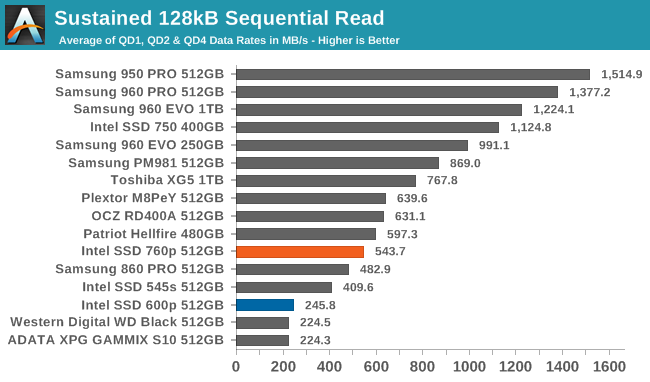
The sustained sequential read speed of the Intel SSD 760p is only slightly above SATA SSD speeds. This makes it more than twice as fast as the Intel SSD 600p, but still far slower than other recent NVMe SSDs using 3D TLC NAND such as the Toshiba XG5 and the Samsung PM981.
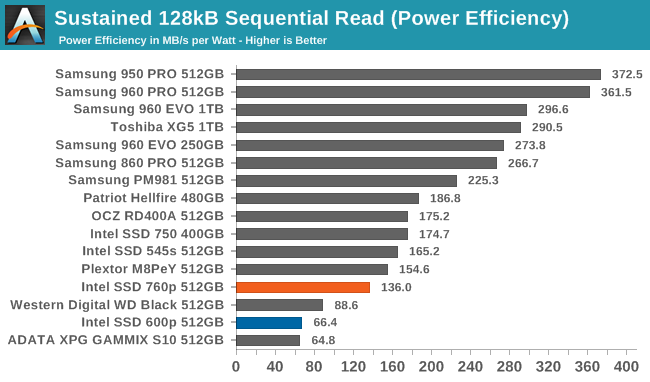
With subpar performance, it isn't surprising to see the Intel SSD 760p score near the bottom for power efficiency. There are a few TLC-based NVMe SSDs that score even worse—including the Intel SSD 600p—but there's clearly a lot of room for improvement here.
 |
|||||||||
The Intel SSD 760p hits its full sequential read speed at QD1, while the 600p required QD4 or higher to offer its full speed. Like most other M.2 NVMe SSDs, the Intel 760p draws about 4W at full speed, and the efficiency differences between drives are mostly due to differences in speed, not power consumption.
Sequential Write Performance
Our test of sequential write burst performance is structured identically to the sequential read burst performance test save for the direction of the data transfer. Each burst writes 128MB as 128kB operations issued at QD1, for a total of 1GB of data written to a drive containing 16GB of data.
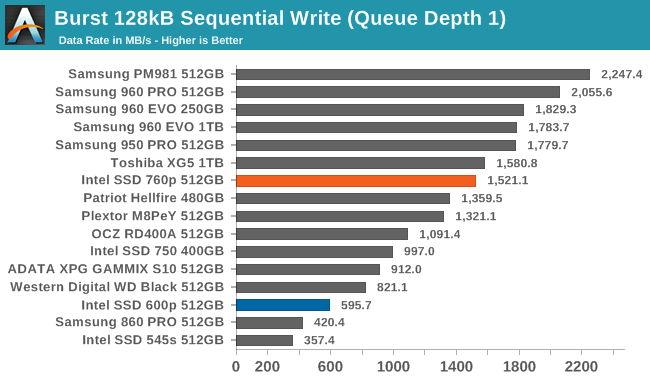
The burst sequential write speed of the Intel SSD 760p is slightly above average and far above Intel's previous flash-based SSDs. It is only slightly slower than the larger 1TB Toshiba XG5, and about 15–20% slower than Samsung's NVMe SSDs.
Our test of sustained sequential writes is structured identically to our sustained sequential read test, save for the direction of the data transfers. Queue depths range from 1 to 32 and each queue depth is tested for up to one minute or 32GB, followed by up to one minute of idle time for the drive to cool off and perform garbage collection. The test is confined to a 64GB span of the drive.
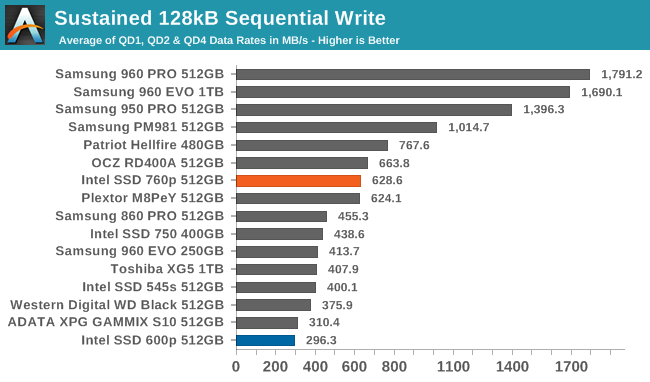
The sustained sequential write speed of the Intel SSD 760p is comfortably above the limits of the SATA interface, which many NVMe SSDs can't manage. However, the Samsung PM981 is 60% faster than the 760p, and the 960 PRO is almost three times faster. The performance of the 760p is reasonable for a low-end NVMe SSD, but it can't compete at the high end.
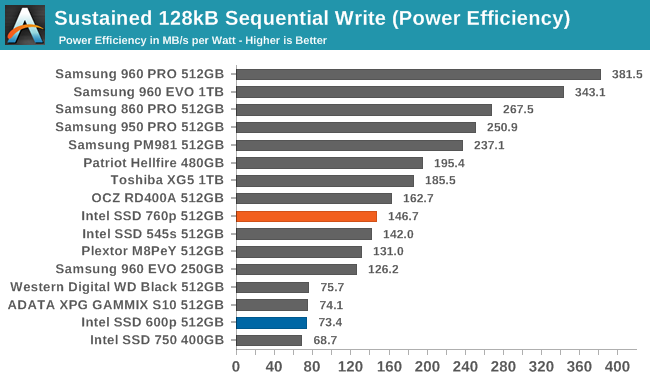
The power efficiency of the Intel SSD 760p on the sequential write test is slightly below average. This is twice the efficiency of Intel's previous NVMe SSDs, but substantially worse than more recent drives from Samsung and Toshiba.
 |
|||||||||
The Intel SSD 760p is very close to its full sequential write speed at QD1, and its performance is steady across the entire test—a marked improvement over the 600p and many other low-end NVMe SSDs. Samsung's PM981 delivered uneven performance on this test but was much faster overall with about the same power draw as the 760p.










51 Comments
View All Comments
rrinker - Wednesday, January 24, 2018 - link
It's not just the speed, it's the handling. A better analogy might be one of the supercars that can hit 300mph.See, in my 25mph residential neighborhood, I often have people running up behind me wanting to go 40 or more. Then I take a turn without touching the brakes, and suddenly they disappear from my mirror. But then my 1993 pickup truck can do the same, so I guess I don't need my BMW after all.
Only - one of those old hard drives I still have in a drawer from 1993 just won't keep up with even the worst SSD I could buy.
Pastuch - Monday, January 29, 2018 - link
The difference between a PC and a BMW is one of them will help you keep your virginity and the other will help you lose it. If the PC is a status symbol to you then I'd suggest you skip your next upgrade and buy yourself a new wardrobe. A 1080 Ti does not equal a hotter girlfriend.megapleb - Tuesday, January 23, 2018 - link
That's certainly the result i expect, but in a review, it feels like something that should be shown repeatedly. Without those results, I think the benchmarks can mislead people into poor buying decisions.Makaveli - Tuesday, January 23, 2018 - link
The Intel 750 still looks like the better drive to me just higher power usage.The $482 price from newegg is also outdated.
I can pick up a brand new 750 drive in Canada for $218 CAD which is $175 USD which is cheaper than the $199 price you have listed for the 760p.
The choice is obvious.
Billy Tallis - Tuesday, January 23, 2018 - link
I try to only make buying recommendations that our readers could actually follow through on. There is not much stock of new Intel 750s left, and even less that could be had for the kind of prices you're quoting. I wouldn't trust anyone selling a "new" 750 for $175 unless it was clearly a liquidation sale from a retailer that was going bankrupt.Makaveli - Tuesday, January 23, 2018 - link
This "anyone" isn't some hipster selling a used drive on eBay. Its a major retail chain in Canada think like micro center in the US. And you are right they are clearing stock for the newer stuff to come in and certainly not going bankrupt they have 35 store locations.Alistair - Wednesday, January 24, 2018 - link
Still his point stands that you are referring to a clearance price. Might only be for a week.Makaveli - Wednesday, January 24, 2018 - link
The price has actually been like that for well over a month.I'm picking up the 1.2TB drive today for $488!
Magichands8 - Tuesday, January 23, 2018 - link
M.2? But, why? And what's with the ridiculously high price/GB? It's 2018 and still for years and years nothing has changed in this industry. And we enter yet another year when SSD manufacturers have given me every reason to spend my money elsewhere.tylerdd - Tuesday, January 23, 2018 - link
Why isnt the intel 900p on any of the charts? It is the current storage king and its not on the charts as a comparison?